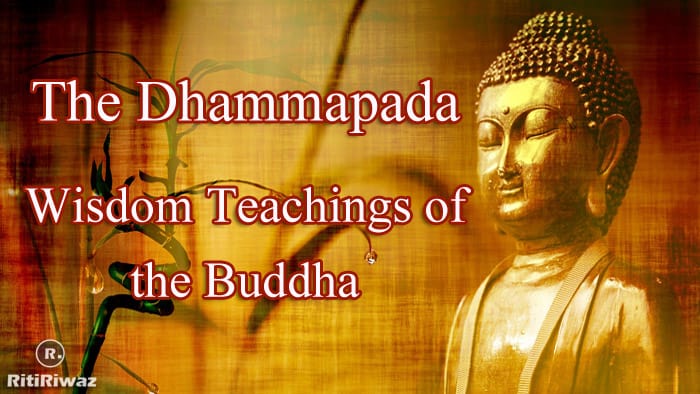Excerpts from Buddha’s The Dhammapada

Dhammapada means “the path of dharma,” the path of harmony and righteousness that anyone can follow to reach the highest good. The Dhammapada is a collection of verses, gathered probably from direct disciples who wanted to preserve what they had heard from the Buddha himself. Here are some excerpts from Buddha’s The Dhammapada
People say the mind is like a monkey, jumping from one thing to another. How can we control it?
The mind is wavering and restless, difficult to guard, and restrain: let the wise man straighten his mind as a maker of arrows makes his arrows straight (33).
What is the eternal law?
For hate is not conquered by hate; hate is conquered by love. This is a law eternal (5)
Who is happy?
The man who does good things is happy in both worlds. He is glad, he feels great happiness when he sees the good he has done (16).
Suggested Read: Thoughts Of Gautam Buddha For Success And Peace
Why are thoughts important?
What we are today comes from our thoughts of yesterday, and our present thoughts build our life of tomorrow; our life is the creation of our mind (2).
Can we criticize others when they do something wrong?
Think not of the faults of others, of what they have done or not done. Think rather of your own sins, of the things you have done or not done (50).
Who is a fool?
How long is the night to the watchman; how long is the road to the weary; how long is the wandering of lives (samsara) ending in death for the fool who cannot find the path (60).
Who is wise?
Even as a great rock is not shaken by the wind, the wise man is not shaken by praise or by blame.
What is the source of joy?
Wherever holy men dwell, that is indeed a place of joy- be it in the village, or in a forest, or in a valley or on the hills (98).
Can we call a person Hero who kills hundreds of people with his AK 47 gun?
If a man should conquer in a battle a thousand and a thousand more, and another man should conquer himself, his would be the greater victory, because the greatest of the victories the victory over oneself (103-105). Suggested Read: Buddha PurnimaShould I postpone doing good things till my old age?
Make haste and do what is good. If a man is slow in doing good, his mind finds pleasure in evil (116).
Lord Krishna (Gita 2-58) compares a tortoise to a self-controlled Yogi and you said something similar.
The man whose hands are controlled, whose feet are controlled, whose words are controlled, who is self-controlled in all things, who finds the inner joy, whose mind is self-possessed, who is one and has found the perfect peace-this man I call a monk (362)
Lord Krishna in Gita says Arise! Attain Glory! The Self is the friend and foe of the Self.
Arise! Rouse thyself by thy Self; train thyself by thyself, thy Self. Under the shelter of thy Self, and ever watchful, thou shall live in supreme joy (379, 380)Buddha, have given one full chapter for Brahmins (Chapter 26) in Dhammapada. Who is a Brahmin according to Buddha?
A man becomes not a Brahmin by long hair or family or birth. The man in whom there are truth and holiness, he is in joy and he is a Brahmin (393)
Who is free from anger, faithful to his vows, virtuous, free from lusts, self-restrained, whose mortal body is his last- him I call a Brahmin. (400)
One should never hurt a Brahmin, and a Brahmin should never return evil for evil (389)
About misers –
Misers certainly do not go to the heaven of the gods (177) Suggested Read: The founder of BuddhismAbout Birth –
It is a great event to be born a man (182).
About Love –
O let us live in joy, in love amongst those who hate! Among men who hate, let us live in love (197).
About Health –
Health is the greatest possession. Contentment is the greatest treasure. Confidence is the greatest friend. Nirvana is the greatest joy. (204)
Buddha, Thanks a lot. You have enlightened us.